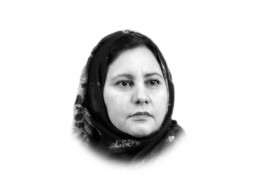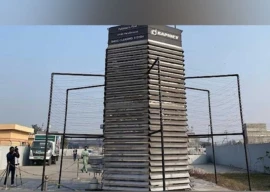
"Every year, the world marks 16 Days of Activism against violence towards women, but one stark question persists: Are we genuinely advancing toward a world free of gender-based abuse, or are we merely celebrating progress that remains largely elusive?"
As the world has recently observed the 16 Days of Activism for the International Day for the Elimination of Violence Against Women, a troubling question remains: can we truly end the centuries-old atrocities that women have faced, or are these observances simply empty rituals, signaling little more than symbolic acknowledgment? The answer, regrettably, is no. The reality we live in is far from a utopia where women are revered like royalty. Instead, it is a world where gender-based violence continues to dominate the lives of millions of women. Although we are witnessing greater independence and achievement among women, these strides forward do not erase the grim truth: violence against women is deeply entrenched across the globe, with Pakistan being one of the worst affected countries.
According to a report by UN Women, a woman is killed every 11 minutes globally, reflecting the tragic prevalence of violence that plagues societies worldwide. In Pakistan, a country where certain rural traditions claim that a daughter is worth "seven Holy Qurans", the custom of karo-kari i.e. honour killing is shockingly still practised. According to the Aurat Foundation's 'Annual Statistics 2020' report, over 11,000 cases of violence against women were documented in 2020. The most prevalent forms of violence included domestic abuse, with 4,775 reported cases, followed by rape and gang rape, which accounted for 2,297 cases, and murders, totaling 1,033 incidents. These numbers are staggering, but they are only the tip of the iceberg. The silence surrounding unreported cases adds to the enormity of the crisis.
A similar tragedy recently unfolded in Saeedabad neighbourhood of Karachi, where Afshan Jamali, an educated and accomplished secondary school teacher, was murdered by her husband. Despite her education and professional achievements, Afshan found herself trapped in a cycle of abuse. Her father revealed that the core reason behind this atrocity was the demanded dowry, even though she had already sacrificed everything to build a life with him. The man she once trusted ended her life, leaving their child motherless.
If a well-educated, empowered woman like Afshan, who was fully aware of her rights, can fall victim to such violence, what hope is there for those who lack resources or support? The suffering of women like Afshan illustrates the depth of societal devaluation of women's lives and the dire need for systemic change.
At the core of this ongoing violence lies a complex web of patriarchal norms, cultural misinterpretations and economic dependence that systematically oppress women. In Pakistan, deeply ingrained patriarchal attitudes place women in subservient roles, limiting their autonomy and reinforcing gender inequality. This imbalance fosters a culture where men are viewed as the primary breadwinners, perpetuating harmful power dynamics that validate violence against women.
Religion in Pakistan is often misused to justify these inequities. Many men selectively manipulate religious doctrines to entrench their power and control. These misinterpretations, often rooted in pre-Islamic cultural practices, perpetuate the marginalisation of women. The result is a skewed view of religion that, rather than empowering women, enables the continuation of violence and oppression.
Additionally, economic dependence deepens gender inequality in Pakistan, where women are significantly underrepresented in the workforce. In 2022, just 22% of women participated in the labour force, one of the lowest rates globally, compared to 84.79% of men. This financial vulnerability leaves many women trapped in abusive relationships, unable to break free due to a lack of resources. The widespread economic disempowerment of women in Pakistan acts as a powerful tool of control, reinforcing their subjugation and limiting their ability to escape cycles of violence.
Despite the existence of laws protecting women rights, their enforcement is notoriously poor, and legal loopholes are often exploited by perpetrators to evade justice. The fear of retribution, societal stigma and distrust in the justice system keep many women from reporting their abuse. Additionally, a prevailing culture of victim-blaming within both the legal system and society at large prevents many survivors from seeking justice, fearing that they will be held accountable for the violence they endured. This cycle of impunity only strengthens the grip of abuse, leaving women vulnerable and unheard.
However, the time for action is long overdue. The systemic gender-based violence in Pakistan demands an immediate and comprehensive response. The legal system must be overhauled to ensure robust protection for women. Laws exist, but they must be enforced with greater commitment. Law enforcement agencies need specialised training to handle gender-based violence cases with sensitivity, and the judicial system must act swiftly and decisively.
Equally important is the need for cultural transformation. Patriarchal norms that justify violence must be dismantled, and widespread public education on gender equality and women's rights must be prioritised. Similarly, media outlets should play a key role in amplifying the voices of women, showcasing successful legal cases, and challenging harmful stereotypes that perpetuate discrimination.
The fight against violence toward women is no longer a matter of debate; it's a fight for the very soul of the nation. As the old adage goes, "When women rise, we all rise." The time to act is now, before more lives are lost, before more women are silenced by fear. If Pakistan is to break free from the chains of abusive realities, it must stand united in its commitment to justice, equality and the fundamental dignity of all its citizens. Let us not be remembered for our inaction, but for our collective resolve to build a future where no woman's life is marred by violence, fear or oppression.












1736332856-0/Untitled-design-(20)1736332856-0-270x192.webp)



1736334465-0/sidra--(45)1736334465-0-270x192.webp)



COMMENTS
Comments are moderated and generally will be posted if they are on-topic and not abusive.
For more information, please see our Comments FAQ